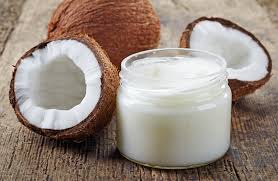
Health Benefits of Coconut Oil
Coconut oil is made from the innermost part of coconuts (Cocos nucifera). It’s a rich, plant-based oil, and it’s one of the few oils that is solid at room temperature.
Coconut oil is thought to have several health benefits, including improving skin and hair texture. However, it does contain a large percentage of saturated fat, which might be connected to adverse health effects like heart disease.1
These opposing viewpoints have led to mixed views on coconut oil’s health benefits, but preliminary research is promising. Coconut oil may encourage fat burning and offer antimicrobial and anti-inflammatory properties that improve oral health.
May Help With Weight Management
Recent research has found that supplementing with MCT oil may significantly reduce body weight, especially when used alongside a low-calorie ketogenic diet. The fats in coconut oil are 65% medium-chain triglycerides (MCTs), so it may have the same effect.2
Preliminary research shows coconut oil may influence fat burning, similar to MCT oil.3 One study found that coconut oil produced a statistically significant decrease in body weight, body mass index (BMI), and fat mass percentage.4 However, the result was minimal. Many nutrition experts are reluctant to tout coconut oil as a weight management tool, especially without more research.
Disclaimer: Body Mass Index, or BMI, is a biased and outdated metric that uses weight and height to make assumptions about body fat and, by extension, health. This metric is flawed in many ways and does not factor in body composition, ethnicity, sex, race, and age. Despite its flaws, the medical community still uses BMI because it’s an inexpensive and quick way to analyze health data.
May Promote Skin Health
Many people use coconut oil to treat skin issues. Whether to promote wound healing, treat dry skin, or keep newly tattooed skin moist, coconut oil has been shown to promote skin health and reduce inflammation. For instance, one study found that people with eczema who used extra virgin coconut oil experienced significant improvement.5 Eczema is a group of chronic skin conditions that can cause skin inflammation, irritation, and swelling.
A number of studies demonstrate the anti-inflammatory properties of coconut oil. Research suggests that applying coconut oil extract to the skin may enhance its ability to provide a protective barrier. It may also offer antimicrobial and anti-itch properties.6
May Improve Hair Health
Coconut oil is often an ingredient in shampoos and conditioners—and for good reason. Older research shows that applying it to your scalp can reduce protein loss in hair. Plus, it performs better than sunflower oil and mineral oil in protecting hair.7
Adding coconut oil to your scalp may have other benefits, too. Research has shown that coconut oil can decrease flaking. It may even promote healthy bacteria on the scalp—a key component of preventing dandruff.8
May Prevent Cavities
Oil pulling, sometimes called oil swishing, is similar to using a mouthwash or an oral rinse. It’s believed to prevent and treat oral and systemic diseases (conditions that affect more than one system). Coconut oil, in particular, is one of the more frequently used oils.9
Research shows that oil pulling reduces bacteria and plaque and improves gingival scores. Gingival scores rate gingivitis inflammation on a scale of 0-3. More importantly, coconut oil reduces your susceptibility to cavities.9
It’s a simple and cost-effective approach to oral health without many limitations.
Nutrition of Coconut Oil
One tablespoon (tbsp) of coconut oil is almost entirely fat, without carbs, fiber, or protein. The vitamins and minerals it contains are negligible. For instance, it only contains 0.003 mg of zinc, 0.007 mg of iron, and 0.136 mg of calcium—all of which are less than 1% of the Daily Value (DV).10 Here is the nutritional breakdown of one tbsp of coconut oil:11
Calories: 121
Fat: 13.5 g, or 17% of the DV
Sodium: 0 mg
Carbohydrates: 0 g
Fiber: 0 g
Sugars: 0 g
Protein: 0 g
Risks of Coconut Oil
Most people are concerned about food allergies, particularly tree nut allergies, when eating coconut oil. However, coconut is technically not a nut: it’s a fruit. That said, the Food and Drug Administration (FDA) does require food manufacturers to list it on food labels as a nut.12 This can be confusing for consumers and has prompted the coconut industry to campaign to have its classification changed.13
Still, it is not unheard of for people to have a coconut allergy. Though it has typically been considered a rare allergy, scientists have noted that the rate of a true anaphylactic response (a severe, life-threatening allergic reaction) is growing. Most of the studies involving coconut allergies have involved kids who already have an allergy of some sort.14
For instance, one study found that of 298 children with a tree nut allergy, 30% had a reaction to coconut. In another study of 191 children with sesame and tree nut allergies, 20% had a reaction. There is also some evidence that people can have allergic reactions or skin irritations when coconut oil is applied topically.14
Another potential risk of coconut oil is its effect on your heart’s health, especially since it is a high-calorie food rich in saturated fats. For instance, some research shows that diets high in saturated fats may increase the likelihood of heart disease in some people.15 Other studies have found that taking two tbsp of coconut oil daily might increase HDL cholesterol (or good cholesterol).16
For these reasons, talk with a healthcare provider or registered dietitian before adding coconut oil to your diet.
Tips for Consuming Coconut Oil
Because coconut oil has a high fat content, you should limit consumption to about one tbsp daily per the U.S. Dietary Guidelines. The guidelines recommend that saturated fats make up less than 10% of your daily intake. If you eat 2,000 calories daily, you should get fewer than 200 calories from saturated fat or about 1.5 tablespoons of coconut oil.17
There are many ways to incorporate coconut oil into your eating plan. For instance, some people add coconut oil to coffee and others like to use it for baking or sautéing.18 Here are some other ways to use coconut oil:
Blend melted coconut oil into a smoothie
Use it as a substitute for butter when baking
Mix melted coconut oil into yogurt for an interesting flavor
Add it to oatmeal or another hot cereal in place of butter
Spread a small amount onto bread (instead of butter) when making a toasted sandwich
Add a small amount to the water when making rice
Roast vegetables or potatoes in a small amount of coconut oil instead of another oil
A Quick Review
Coconut oil is a popular oil made from coconut meat. It’s a solid oil that offers various health benefits. For instance, research has shown that it may help people lose weight, improve skin texture, and boost hair health. It may even be useful in preventing cavities. That said, it’s also predominately saturated fat, so there is a risk that eating too much of it could have adverse effects.
Talk to a healthcare provider if you want to add coconut oil to your daily diet. They can advise you on potential benefits and risks based on your individual situation.


